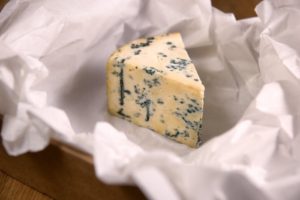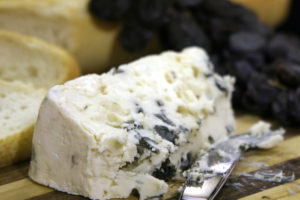Victoria Weldon of Herald Scotland writes that a cheese firm at the centre of an E.coli outbreak is threatening legal action to prevent a ban on sales of its popular delicacy.
 Dunsyre Blue, a mould ripened, gourmet cheese from Lanarkshire, is suspected of being the source of last month’s outbreak which struck down 16 people, hospitalising two.
Dunsyre Blue, a mould ripened, gourmet cheese from Lanarkshire, is suspected of being the source of last month’s outbreak which struck down 16 people, hospitalising two.
Makers Errington Cheese were initially forced to recall two batches but claim they have now been ordered to halt all sales or face enforcement action.
It follows fresh tests carried out by FSS identifying genes that, while not confirmation of E.coli, indicate a “presumptive positive” result for naturally occurring bacteria strains.
Company founder Humphrey Errington claims the ban is “unprecedented” and argues that scientific evidence suggests presumptive positive results are notoriously inconclusive, adding, “The behaviour of FSS is monstrous. They blamed our cheese for this outbreak in the absence of any hard evidence and have refused to share with us details of their investigation. We had independent tests carried out two weeks ago that showed the suspected batches of cheese were not contaminated. We shared these results with FSS and they said nothing to restore public trust in the product.”
Errington said the ban on Dunsyre Blue, which accounts for about two-thirds of the company’s revenue, was a “catastrophe” and revealed that his lawyers will decide today whether or not to take legal action.
“I’m afraid I can see this ending up in the courts,” he told the Sunday Times.
Dunsyre Blue is characterised by its chunky blue-green moulds and is favoured by the Queen and Michelin-starred restaurants, including an eaterie run by renowned chef Andrew Fairlie at Gleneagles resort in Perthshire.
It became the focus of the health scare after 14 people in Scotland and two in England were struck down with E.coli in July, suffering stomach cramps, diarrhoea, vomiting and fever.
By the end of the month, health officials announced that Dunsyre Blue was the most likely cause of the outbreak.
However, questions are now being asked over the strength of evidence linking the cheese to the outbreak.
Hugh Pennington, professor of bacteriology at the University of Aberdeen, said: “I don’t know if Dunsyre Blue was the cause or not, but if you’re going to accuse Errington’s cheese of being the vector of the outbreak, then without further ado effectively destroy his business, then I think you should have stronger evidence than just ‘some people ate the cheese’.”
A spokesman for FSS said that all victims had been contaminated with the same strain of E.coli O157 and that “there is a strong link with certain batches [C22 and D14] of Dunsyre Blue cheese”.
He added: “Dunsyre Blue cheese remains the most likely source of this outbreak, with confirmed cases becoming unwell between July 2 and 15. It would not be appropriate to respond in more detail as investigations have not yet concluded.”
 The Crown Office had previously said South Lanarkshire-based Errington Cheese would not face prosecution over the child’s death.
The Crown Office had previously said South Lanarkshire-based Errington Cheese would not face prosecution over the child’s death.


